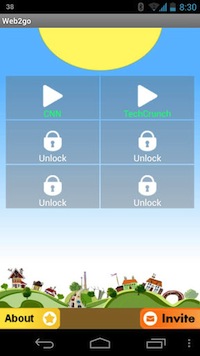There’s no shortage of apps on Android that offer to read news feeds out loud — Google’s mobile OS includes built-in text-to-speech (TTS) functionality, making it a snip for devs to add speech-related features. But the problem is that a lot of these TTS-powered apps do a poor job of deciphering the main content on a web page versus all of the other superfluous text. That’s where Web2go, an Android app from Israeli startup Volacent, claims to have got the experience right with technology it’s calling ARI (Artificial Reading Intelligence) that uses pattern matching to work out what text on a web page is and isn’t relevant.
The otherwise barebones and free app offers a directory of Web2go-enabled news sites — around 170 but with more being added daily — which users pick from and pin to one of the available slots on the app’s home screen. Initially, only four slots are available, but in an unapologetic bid to go viral, more can be unlocked by sharing the app with friends. Using a radio station analogy, users then tap on one of their saved news stations to begin having Web2go read its content out loud. A swipe skips to the next article, and so on.
Along with being smart enough to read only the meaningful text from articles, ignoring things like navigation text, menu items, ads, and captions (and, rather bluntly, any text in parentheses), Volacent says that its text-to-speech engine, which I’m told is powered by NeoSpeech, makes it stand out from competitors with a higher-quality and more human-like voice. That may be the case, though I still found it quite fatiguing to listen to for any length of time, but you might be more forgiving.
The app also supports Mono and A2DP Bluetooth for connection to car hands-free speaker systems and the like, which makes perfect sense given that listening to the news is already part of many people’s daily commute.
CEO and co-founder Shahar Karni tells me that the inspiration for Web2go came when a family member was diagnosed with eye cancer, requiring a period of radiation treatment that meant that they were unable to use both eyes for a month. Thus a search began for an application that would ‘read’ their favorite news sites and blogs, but that search fell short as the apps available often had poor voice quality and “didn’t read the articles in a way you can actually understand”, says Karni. He then saw an opportunity to develop an app for visually impaired people, although obviously the market for something like Web2go is much broader.
To that end, the app is free to download and use, though Karni says monetization could come in the form of “voice commercials” with a revenue share offered to publishers. Meanwhile, a version of Web2go for iOS is said to be “coming soon”.
